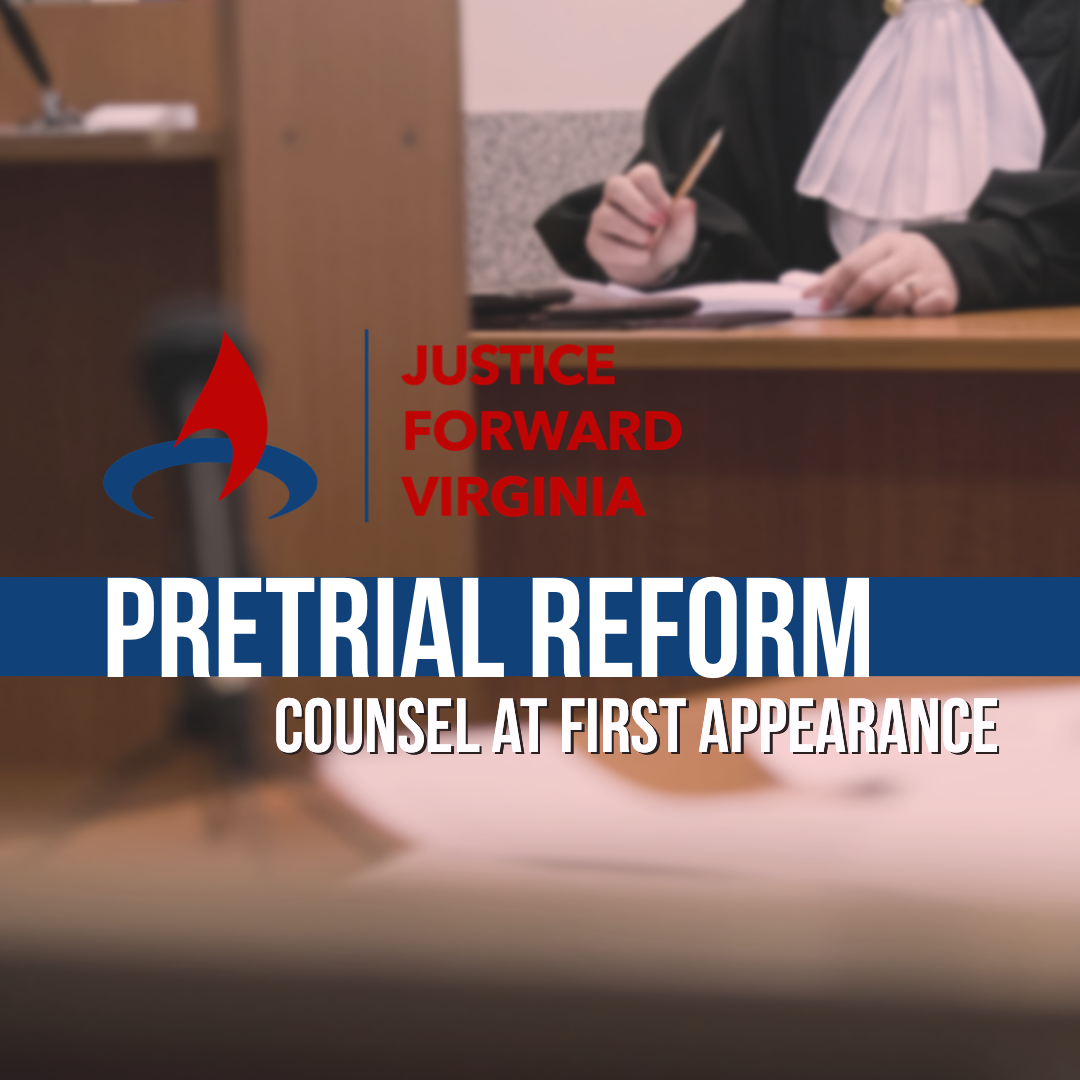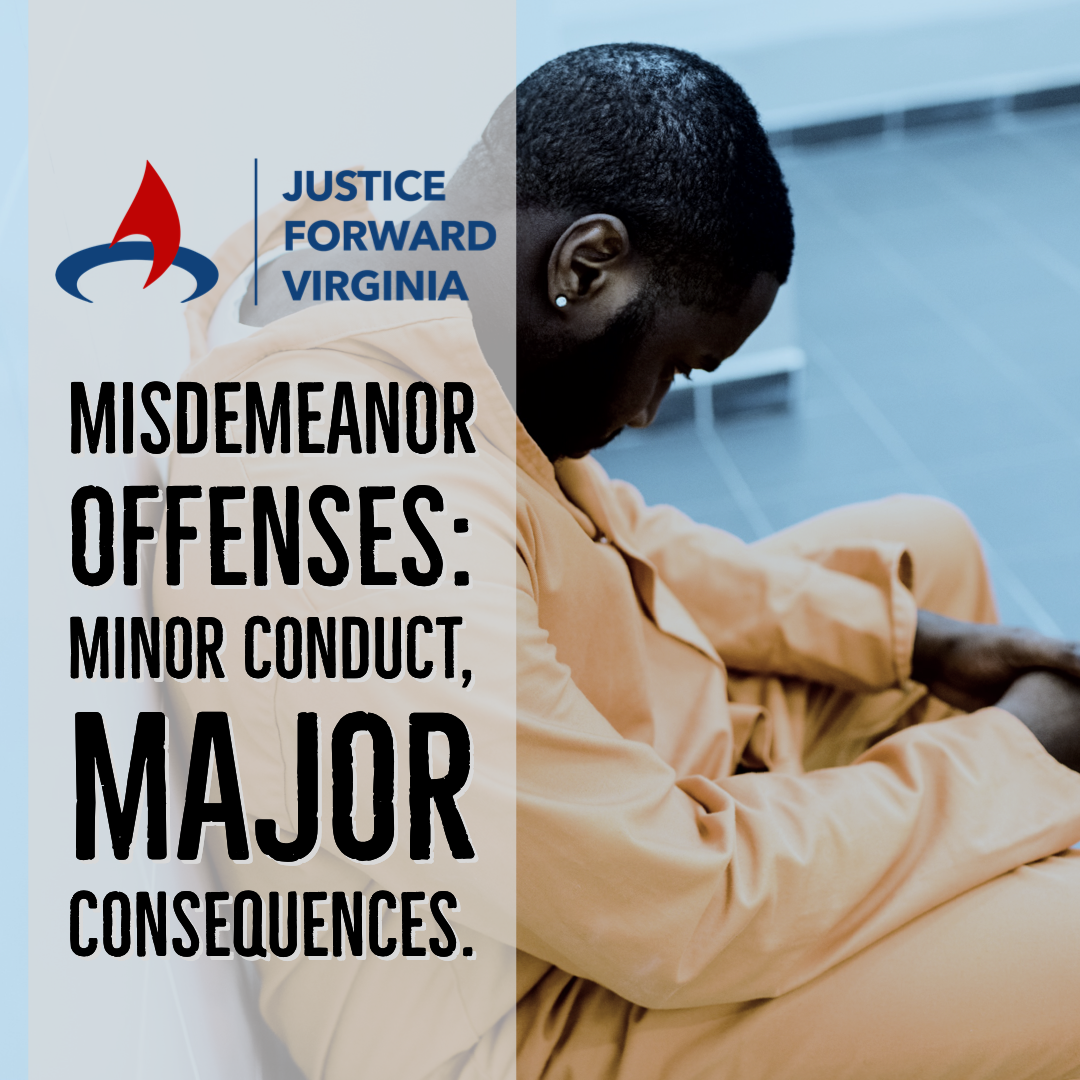Bail Reform
What is Bail?
As it stands, Virginia employs a cash bail system. In this system, after a person is arrested, a judge must determine whether pretrial release is appropriate. If it isn’t, the person is held without bail. If it is, then the judge can either order release on one’s own recognizance—just a promise to come to court (sometimes with a penalty for failing to do so)—or on the condition of payment of a secured money bond.
When secured bonds are used, the amount of money that must be paid before being released is known as a person’s cash bail or bond. There is no fixed schedule for bond amounts, but typical amounts might be $500-5000 for misdemeanors; $2500-10,000 for property and drug felonies; and $25,000-50,000 or much more for serious felonies.
Although on rare occasion a person might be able to pay that amount without assistance, in the vast majority of cases, defendants must retain the services of a bail bonds agent, also known as a surety, to make the payment for them. Bail bonds companies typically charge defendants about 10% of the total bond amount: so, $100 on a $1000 bond, $500 on a $5000 bond, and so on. If a person cannot make the payment, either personally or through a surety, they will remain incarcerated based on their inability to pay the money bail.
Why is Bail Reform Necessary?
Virginia’s cash-based bail system is deeply flawed. Money bail prevents many indigent defendants, and almost exclusively indigent defendants, from leaving jail while their cases are pending.
Nationwide, 34% of defendants are kept in jail pretrial solely because they are unable to pay a cash bond.
Most of those people are among the poorest third of Americans.
When pretrial detention depends on whether someone can afford to pay a cash bond, two otherwise similar pretrial defendants will face vastly different outcomes based merely on their wealth:
Those who can pay almost always do;
Those who can’t never do.
Those who can’t pay are left to suffer a host of negative consequences proven to result from pretrial detention:
Loss of employment or ability to seek employment
Interference with education
Housing instability
Effects on child custody
An impaired ability to prepare an effective defense
Increased risk of recidivism
Bail Reform: Not as Controversial as You’d Think
Bail reform is much less as controversial than many have been led to believe. It is simply an effort to improve pretrial outcomes by substituting evidence-based practices for cash bail. If an alternative exists that allows cases to be heard just as efficiently, while assuring the safety of the community, and minimizing inequality and intrusions on individual liberty, why not use it?
The most popular model for improving the current system relies on a risk-based approach. This model starts with the presumption that the majority of pretrial defendants should be released. It then uses researched, validated assessment tools to determine if that presumption is tenable. If the assessment tools show that a defendant is a risk for failing to appear or offending while at liberty, then the model imposes appropriate, evidence-based conditions to address that risk.
Virginia’s History with Bail Reform
Another reason bail reform shouldn’t be controversial in Virginia: we’ve been engaged in it for over two decades—and we’ve done so under the belief that it promotes public safety.
In 1994, the General Assembly passed the Pretrial Services Act, the purpose of which was to enhance public safety by establishing pretrial services agencies. The bill also included a directive that the Department of Criminal Justice Services research and create a pretrial risk assessment instrument. Research studies began in 1998 and a risk assessment tool was created soon after.
That risk-assessment tool—the Virginia Pretrial Risk Assessment Instrument (VPRAI) —follows a model similar to that which has been proposed in states that are only now considering bail reform. It has since been validated, and supplemented by the Praxis, which is used in conjunction with the VPRAI to make recommendations about whether to release a defendant before trial, and if so, on what conditions. Pretrial officers throughout the Commonwealth have been trained to use the VPRAI, and courts that use it as intended have significantly reduced the number of defendants held in jail.
Because We’re Several Steps Ahead, a Unique Approach to Reform is Required
Unlike many other states that have reformed cash bail systems in recent years, Virginia isn’t working with a blank canvas. So rather than start over, Virginia’s reforms should seek to build on the work that has already been done.
The Legislature Should Consider the Following Reforms
Require an “ability-to-pay” assessment, to determine the ability of a defendant to pay a cash bond and allow the court to adjust or eliminate bond based on the defendant’s financial circumstances.
Mandate preparation and consideration of the VPRAI by courts.
Create a presumption that the VPRAI recommendation be followed unless rebutted by the Commonwealth.
Identify offenses for which persons may neverbe held without bond.
Implement safeguards to eliminate subjectivity and avoid disparate impacts on the poor and minorities.
Strengthen pretrial services.
Consider regulating or prohibiting compensated securities (i.e. bail bondsmen), and instead allow cash bonds to be paid through the clerk of court.







